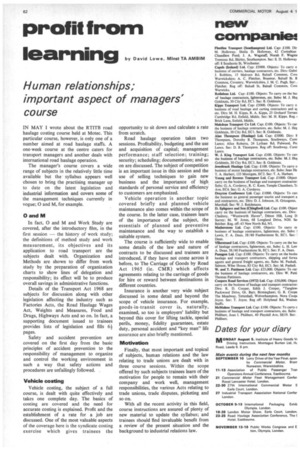profit from
Page 64

If you've noticed an error in this article please click here to report it so we can fix it.
learning by David Lowe, Mlnst TA AMBIM
Human relationships; important aspect of managers' course
IN MAY I wrote about the RTITE road haulage costing course held at Motec. This particular course, however, is only one of a number aimed at road haulage staffs. A one-week course at the centre caters for transport managers and another deals with international road haulage operation.
The manager's course covers a wide range of subjects in the relatively little time available but the syllabus appears well chosen to bring the practising manager up to date on the latest legislation and industrial information and covers some of the management techniques currently in vogue; 0 and M, for example.
0 and M
In fact, 0 and M and Work Study are covered, after the introductory film, in the first session — the history of work study; the definitions of method study and work measurement, its objectives and its application to road transport are the subjects dealt with. Organization and Methods are shown to differ from work study by the preparation of organization charts to show lines of delegation and responsibility; its effect will be to produce overall savings in administrative functions.
Details of the Transport Act 1968 are subjects for discussion along with other legislation affecting the industry such as Factories Acts, the Road Haulage Wages Act, Weights and Measures, Food and Drugs, Highways Acts and so on. In fact, a supporting document issued to trainees provides lists of legislation and fills 64 pages.
Safety and accident prevention are covered on the first day from the basic principles of accident prevention to the responsibility of management to organize and control the working environment in such a way that safety actions and procedures are unfailingly followed. .
Vehicle costing
Vehicle costing, the subject of a full course, is dealt with quite effectively and takes one complete day. The basics of costing are covered and the need for accurate costing is explained. Profit and the establishment of a rate for a job are discussed. One of the most valuable aspects of the coverage here is the syndicate costing exercise which gives trainees the opportunity to sit down and calculate a rate from scratch. •
Road haulage operation takes two sessions. Profitability, budgeting and the use and acquisition of capital; management performance; staff selection; training; security; scheduling; documentation; and so on are discussed. The subject of competition is an important issue in this session and the use of selling techniques to gain new business and the importance of high. standards of personal service and efficiency to customers are emphasized.
Vehicle operation is another topic covered briefly and planned vehicle maintenance also comes within the scope of the course. In the latter case, trainees learn of the importance of the subject, the essentials of planned and preventive maintenance and the way to establish a suitable system.
The course is sufficiently wide to enable some details of the law and nature of contracts to be discussed and trainees are introduced, if they have not come across it before, to The Carriage of Goods by Road Act 1965 (ie. CMR) which affects agreements relating to the carriage of goods for hire or reward between destinations in different countries.
Insurance is another very wide subject discussed in some detail and beyond the scope of vehicle insurance. For example, goods-in-transit cover is, naturally, examined, so too is employers' liability but beyond this cover for lifting tackle, special perils, money, fidelity guarantees, estate duty, personal accident and "key man" life assurance are also briefly mentioned.
Motivation
Finally, that most important and topical of subjects, human relations and the law relating to trade unions are dealt with in three course sessions. Within the scope offered by such subjects trainees learn of the motivation for people to remain with their company and work well, management responsibilities, the various Acts relating to trade unions, trade disputes, picketing and so on.
With all the recent activity in this field, course instructions are assured of plenty of new material to update the syllabus; and trainees should find invaluable benefit from a review of the present situation and the background to industrial relations law.








































































































